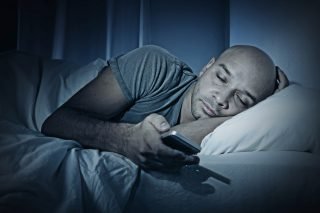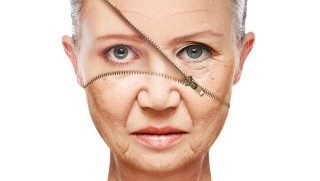A new scientific study confirms the blue light emitted by smartphones and other digital devices will age us faster. It may even lead to brain damage after consistent long-term use.
Research Findings
The research, published in the journal Aging and Mechanisms of Disease, was based on experiments on common fruit flies. It showed that prolonged exposure to this light spectrum impaired their mobility and caused their brain cells to deteriorate. Even blind flies — which had a mutation that stopped them from developing their eyes — showed a similar type of damage.
This implies that the flies did not even have to “see” the light to be harmed by it.
Blue Light Interferes With Sleep. But Now There’s More Impact On How Fast You Age
We are all subjected to increasing amounts of light in the blue spectrum through our cellphones, laptops, and other similar devices.

For some time several scientific studies have shown blue light is a form of light that’s especially aggressive in triggering sleeplessness. Blue light suppresses melatonin production for more than twice as long as other light wavelengths. It also alters circadian rhythms by twice the degree. Interference with the body’s 24-hour circadian rhythms can have a significant effect on health. This creates problems with the cardiovascular, metabolic, and immune systems; disturbing mood; and compromising cognitive function. When your circadian rhythms are out of whack, you think, feel, and perform below your best. Over time, your health can be put at risk.
Concerns About Blue Light Are Growing
According to Nature.com “LED technologies are relatively new; therefore, the long-term effects of exposure to blue light across the lifespan are not understood.”
The scientists who completed this latest study investigated the effects of light on the model organism, Drosophila melanogaster. They determined that flies maintained in daily cycles of 12-h blue LED and 12-h darkness had significantly reduced longevity compared with flies maintained in constant darkness or in white light with blue wavelengths blocked.
Long Term Exposure Is A Concern
Even exposure to adult flies to 12 h of blue light per day accelerated the aging phenotypes causing damage to retinal cells, brain neurodegeneration, and impaired locomotion.
The study also suggests that cumulative light exposure acts as a stressor during aging. The scientists found that several known blue-light-sensitive proteins are not acting on pathways mediating detrimental light effects. They say their findings raise questions about whether spending too much time exposed to artificial light can impact overall health.
Jaga Giebultowicz, a professor at Oregon State University’s department of integrative biology, told ScienceFocus.com “Humans are subjected to increasing amounts of light in the blue spectrum since commonly used LEDs emit a high fraction of blue light. But this technology, LED lighting, even in most developed countries, has not been used long enough to know its effects across the human lifespan.”
How Blue Light Will Age You
The researchers confirmed that flies exposed to blue light showed damage to their retinal cells and brain neurons and had “significantly” shorter lives compared to those kept in complete darkness.

Blue light flies also demonstrated reduced climbing ability — a common sign of aging. Even relatively mild light was seen to shorten their lifespan by 5-15%, the researchers added.
Giebultowicz points out that this result cannot be applied to humans as the human brain “would receive much less light than the flies brains”.
However, she added: “We can only say that long-term exposure to blue light has damaging effects on cells — and cells in flies and humans function in a similar way.”
Giebultowicz said: “It was very clear cut that although light without blue slightly shortened their lifespan, just blue light alone shortened their lifespan very dramatically.”
If given a choice, Giebultowicz said, the flies would avoid blue light.
How To Deal With Blue Light If You Care About How You Age
Michael J Breus Ph.D explains how to protect yourself against blue light exposure. He says he has seen an avalanche of evidence in recent years about the potential hazards of blue-wavelength light. Here are his top tips for protecting yourself as you age:
Carotenoid supplements.
Research suggests carotenoid supplements may help strengthen the eye’s natural ability to block blue light. The eye has its own blue-light shield—it’s called the retinal pigment epithelium. This is a thin layer of cells near the retina. The epithelial layer protects the retina against macular degeneration. It also acts as a filter for blue-wavelength light. The cells of this layer contain carotenoids, which we absorb through our diet. Research indicates carotenoids are effective at absorbing blue-wavelength light. Carotenoids including lutein and zeaxanthin. These are available in supplement form and may not only help protect the eye, but also may help protect against any unwanted stimulating effects of blue-light exposure.
![age better avoid blue light [longevity live]](https://longevitylive.com/wp-content/uploads/2019/10/design-desk-eyewear-313690-320x240.jpg)
Blue light–filtering software and apps
There are a number of apps that work to reduce blue-light exposure during evening hours. Many smartphones and tablets include these blue light–filtering apps as part of their operating systems.
Blue light–blocking filters and glasses
Both filters for screens and blue light–blocking eyewear are available to reduce unwanted, poorly timed exposure. Amber tinted glasses help block the bad blue light.
Targeted specialty light bulbs
One of the most effective ways to manage light exposure is to use LED light bulbs that provide the specific kind of light that’s best for day and night. Energy efficient LED light bulbs are now made with our circadian biology in mind. Designed to minimize the negative effects of blue-wavelength light at night, they then take advantage of those stimulating effects during the day. Lighting Science’s Good Night bulbs and Good Day bulbs are helpful. These daytime bulbs are designed to help stimulate alertness and boost focus.
Keep screens away from your face at night
It’s one thing to relax in front of the television for a while during the evening and quite another to have your head buried in your smartphone right up until lights out. The degree and intensity of artificial and blue-wavelength light exposure matter. As part of your Power Down Hour, give yourself a mobile device cut-off time. That’s when you’ll stow your phone for charging—somewhere other than your bedside table. The closer you get to bedtime, the less interactive your media consumption should be. Studies show that social media and other highly interactive forms of media (think: video games and app games) are especially disruptive to sleep.
The Bottom Line
Research into the effects of blue light will no doubt be ongoing. Modern light exposure requires modern solutions and strategies. Pay attention to your “light diet” and use the help that’s available to make the light in your life work on behalf of your health and well-being. If you care about your health and how you age, then you need to manage your time spent on devices better. And anyway, simply by reducing your screen time down, you’ll improve your good health all around.



![women [longevity live]](https://longevitylive.com/wp-content/uploads/2020/01/photo-of-women-walking-down-the-street-1116984-100x100.jpg)










